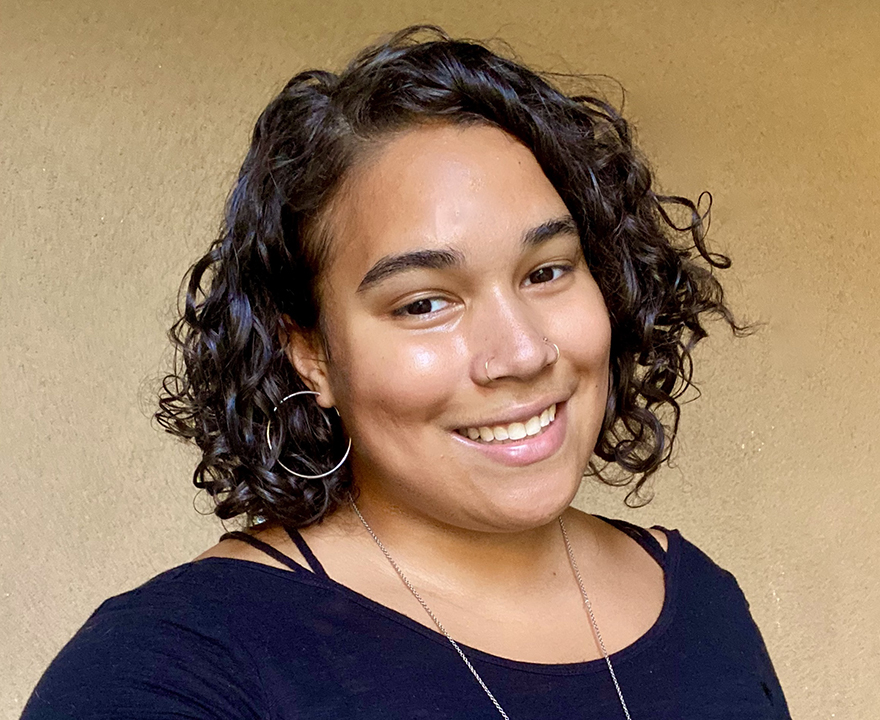Navigating the brain's complexity

Navigating the brain's complexity
- November 13, 2023
- Personal experience inspired UCI cognitive science grad student Elle Giovanni to study how traumatic brain injuries impact decision-making
-----
When UCI cognitive sciences graduate student Elle Giovanni was 13 years old, her mother was struck by a car in a parking lot. Giovanni, who was nearby, saw the physical injuries but did not initially realize that there had been a traumatic brain injury, as well. As she witnessed the long recovery process firsthand, she was fascinated to see how her mom's decision-making changed. She became interested in looking at "behavior that kind of went awry," she says.
"I've always been really interested in how people function and how they navigate their environment," she says. Having studied psychology at USC as an undergrad, Giovanni, who is from Texas, realized that she wanted to zero in on how the brain relates to behavior.
"Psychology is so broad, and I'm really interested in neuropsychology," she says. "Even though I came in not knowing how to do a lot, I knew that if I came here and I dove in, that I would be able to become the cognitive scientist that I always wanted to be, versus the psychology student I saw myself as."
UCI's Department of Cognitive Sciences was "doing the things that I wanted to do," says Giovanni, who appreciates its interdisciplinary approach and the integration of traditional psychology with neuroscience. For example, the department has two MRI scanners that grad students like herself have access to. "The department has really great faculty in terms of brain imaging as well as computational modeling, which is something that I wanted to jump into."
Giovani's advisor, Mimi Lilijeholm, has pushed her to grow as a researcher here. "I kind of was shying away from programming as an undergraduate, and she basically told me that to get my Ph.D. and not learn how to program would be a disservice to myself," Giovanni says. "It was one of the most valuable pieces of advice anyone's ever given me."
Liljeholm, an associate professor and the director of graduate studies in the Department of Cognitive Sciences, says that Giovanni is not only deeply interested in fundamental aspects of cognition and motivation but also eager to challenge herself. "She has the talent and tenacity to acquire and deploy a range of sophisticated computational and neuroscientific techniques," says Liljeholm.
Giovanni's neuropsychology research focuses on value-based, goal-directed decision making, which examines how people make decisions to achieve particular outcomes. "I'm looking at different actions that someone has taken, or could take, and assigning values to them relating to how well they are able to achieve this particular goal," she says. As opposed to habits, which are reflexive, "goal-directed decision making is really computationally expensive and takes a lot of time and takes a lot of cognitive effort," she explains.
"I studied the basics of that and also looked at particular populations, specifically individuals with traumatic brain injury and how their goal-directed decision making is changed by a history of traumatic brain injury, whether that's the number of brain injuries, the severity, how old they were," says Giovanni. "What we've seen is that, most of the time, there's a deficit after traumatic brain injury in goal-directed decision making, particularly with instrumental divergence or flexible instrumental control."
Instrumental divergence measures the difference between alternative actions in regard to their outcome probability distributions. It exists when an individual has a choice of which action they can take, and those actions would yield different outcomes. "Decision-making takes a lot of effort, and so if you're going to go through that expensive process, you want it to actually be where your actions produce different results," she says. "Otherwise, you might want to try to choose your actions in another way that takes a lot less time, and you might as well save your mental effort for tasks that will help you achieve your goal and are worth the effort."
Typically, Giovanni's research has shown that individuals prefer areas with high degrees of instrumental divergence. That is, they seek distinct actions that produce distinct outcomes. "But we kind of see a reversal in individuals with TBI," she says. "They actually choose the environments with greater degrees of instrumental divergence a lot less." People in this latter category prefer to let the computer choose for them, and it produces the same outcome either way.
"Behaviorally, that's really interesting," says Giovanni.
Liljeholm notes that Giovanni is committed to leveraging this research, "together with her personal experiences and intuition, to improve the lives of vulnerable populations."
Indeed, as Giovanni looks toward the future after her spring 2026 graduation, she has lofty goals. "I want to have my own lab. I want to work in academia. I want to be a professor," she says. "I would like to maybe do a postdoctoral position that focuses more heavily on people with traumatic brain injury, or to continue in the computational modeling, in terms of brain signals during decision making."
Whatever she does, she would love to stay in California. "That's something I definitely don't miss about Texas," she says with a laugh. "The winter."
-Alison Van Houten for UCI Social Sciences
-----
Would you like to get more involved with the social sciences? Email us at communications@socsci.uci.edu to connect.
Share on:
Related News Items
- Careet RightAttending the National Conference for Black Political Scientists
- Careet RightThe changing bilingual brain
- Careet RightQ&A with soon-to-be professor Hannah June Kim
- Careet RightSeven soc sci graduate students selected as 2019 UCI Pedagogical Fellows
- Careet RightAs we age, together: collaboration for a global issue


